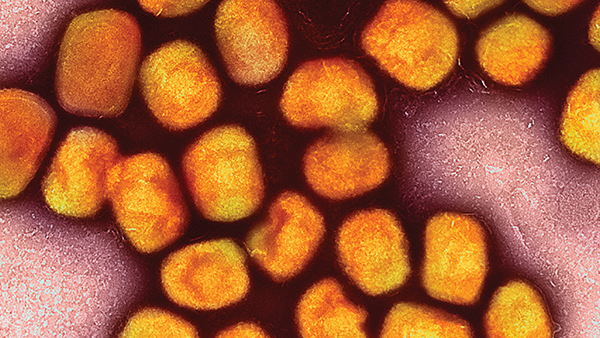Discovery Digest
Bringing you the latest research and news in infectious disease
First to five. Pfizer has approved the first and only pentavalent meningococcal vaccine in the US for preventing the five most common serogroups causing meningococcal disease (1). Penbraya has been approved for use in adolescents and young adults (aged 10–25 years), and provides the broadest coverage of any meningococcal vaccine available in the country.
Sweet escape. Researchers have developed a deep learning framework – named “EVEscape” – to forecast viral escape (2). The model demonstrated high accuracy at predicting pandemic escape mutations for SARS-CoV-2, but the researchers state it can be generalized to other viruses such as influenza and HIV, and to viruses with pandemic potential that have been largely overlooked in research, such as Lassa and Nipah virus.
Throwing caution to the wind. Research into dangerous pathogens is becoming more commonplace as scientists try to prepare against potential future pandemics – but at what risk? In his recent editorial in Science, Piers Millett warns that an increase in maximum containment labs researching high-risk pathogens has not been met with sufficient increase in safety and security (3).
Changing routes. Tuberculosis is the leading cause of HIV-associated opportunistic infection and often leads to death. The Bacille Calmette–Guérin (BCG) TB vaccine is administered intradermally, but is contraindicated in people who are immunosuppressed. What about intravenous administration? In a recent study, researchers investigated whether the alternative route could protect simian immunodeficiency virus (SIV)-infected macaques – demonstrating that intravenous BCG vaccination elicits robust protection against tuberculosis infection in these animals (4).
In Other News
Skin deep. Lab-grown human skin can successfully facilitate mpox viral replication and help researchers uncover new insights about mpox infection (5).
Broad brush. Researchers identify broad-spectrum antiviral against dengue virus, SARS-CoV-2, and other single-stranded RNA viruses (6).
All-rounder. Trivalent RBD nanoparticle vaccine protects mice against highly pathogenic and lethal Merbecovirus and Sarbecovirus (7).
Gut feeling. Fecal microbiota transplants show potential for reducing multidrug-resistant organisms in gut and replacing them with more susceptible strains (8).
Five second rule. Risk of SARS-CoV-2 airborne transmission peaks within five seconds during face-to-face encounters in both ventilated and non-ventilated environments (9).
References
- Pfizer, “FDA Approves PENBRAYA™, the First and Only Vaccine for the Prevention of the Five Most Common Serogroups Causing Meningococcal Disease in Adolescents” (2023). Available at: bit.ly/49mD8Ts.
- NN Thadani et al., “Learning from prepandemic data to forecast viral escape,” Nature, 622, 818 (2023). PMID: 37821700.
- P Millet, “Safeguard the world’s worst pathogens” (2023). Available at: bit.ly/3SuNJFT.
- EC Larson et al., “Intravenous Bacille Calmette–Guérin vaccination protects simian immunodeficiency virus-infected macaques from tuberculosis,” Nat Microbiol, [Online ahead of print] (2023). PMID: 37814073.
- P Li et al., “Mpox virus infection and drug treatment modelled in human skin organoids,” Nat Microbiol, [Online ahead of print] (2023). PMID: 37828248.
- K Uemura et al., “2-thiouridine is a broad-spectrum antiviral nucleoside analogue against positive-strand RNA viruses,” Proc Natl Acad Sci U S A, 120, e2304139120 (2023). PMID: 37831739.
- DR Martinez et al., “Vaccine-mediated protection against Merbecovirus and Sarbecovirus challenge in mice,” Cell Rep, [Online ahead of print] (2023). PMID: 37858337.
- MH Woodworth et al., “Fecal microbiota transplantation promotes reduction of antimicrobial resistance by strain replacement,” Sci Transl Med, 15, eabo2750 (2023). PMID: 37910603.
- T Asai et al., “Peak risk of SARS-CoV-2 infection within 5 s of face-to-face encounters: an observational/retrospective study,” Sci Rep, 13, 17520 (2023). PMID: 37845540.





